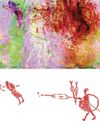
IN THE EARLY TENTH CENTURY A.D., the Khitan, a coalition of nomadic tribes native to eastern Mongolia and parts of China, took advantage of political instability in the region to establish an empire. They conquered a vast swath of northern Asia, stretching from the border of the Korean Peninsula across large portions of northern China, southern Siberia, and Mongolia. Included in their realm, which came to be known as the Liao Empire, was a significant area of traditionally Chinese territory inhabited by settled farmers, as well as great expanses occupied by various other nomadic tribes, who raised herds of horses, sheep, goats, and camels on the grassy steppe. The Khitan elite themselves continued to follow a nomadic lifestyle, honing their skills as mounted warriors and tending their own herds. The Liao emperors and their courts moved among five different capitals, where they lived in tents, and spent a good deal of time at seasonal hunting and fishing camps.
Starting with the empire’s founder, Abaoji, who united the often fractious Khitan tribes, the Liao operated an unusual hybrid government that consisted of a southern administration responsible for the heavily Chinese parts of their empire, and a northern administration that dealt with tribal areas. The former was modeled on Chinese dynasties of the time and was staffed by ranks of civil servants, many of them Chinese, selected through an exam system. The latter followed traditional Khitan practices, and those who rose to power were generally members of the royal clan, who inherited their positions. “The Liao approach was to control everyone according to what they were used to,” says Michal Biran, a historian at the Hebrew University of Jerusalem. “They controlled the nomads as nomads did, and the Chinese as the Chinese did. It worked quite well because it kept them in power for two centuries.”
This story is from the November/December 2020 edition of Archaeology.
Start your 7-day Magzter GOLD free trial to access thousands of curated premium stories, and 8,500+ magazines and newspapers.
Already a subscriber ? Sign In
This story is from the November/December 2020 edition of Archaeology.
Start your 7-day Magzter GOLD free trial to access thousands of curated premium stories, and 8,500+ magazines and newspapers.
Already a subscriber? Sign In

A Very Close Encounter
New research has shown that human figures painted in red on a rock art panel in central Montana depict individuals engaged in a life-or-death encounter during an especially fraught historical moment.

A Sword for the Ages
A zigzag pattern, now tinged with the green-blue patina of oxidized metal, adorns the octagonal hilt of a rare sword dating to the Middle Bronze Age in Germany (1600-1200 B.C.) that was recently excavated in the Bavarian town of Nördlingen.

Ancient Egyptian Astrology
For centuries, layers of soot have coated the ceilings and columns in the entrance hall of Egypt's Temple of Esna. Now, an Egyptian-German team of researchers, led by Hisham El-Leithy of the Egyptian Ministry of Tourism and Antiquities and Christian Leitz of the University of Tübingen, is restoring the temple's vibrant painted reliefs to their original brilliance.

BRONZE AGE POWER PLAYERS
How Hittite kings forged diplomatic ties with a shadowy Greek city-state

RITES OF REBELLION
Archaeologists unearth evidence of a 500-year-old resistance movement high in the Andes

Secrets of Egypt's Golden Boy
CT scans offer researchers a virtual look deep inside a mummy's coffin

When Lions Were King
Across the ancient world, people adopted the big cats as sacred symbols of power and protection

UKRAINE'S LOST CAPITAL
In 1708, Peter the Great destroyed Baturyn, a bastion of Cossack independence and culture

LAPAKAHI VILLAGE, HAWAII
Standing beside a cove on the northwest coast of the island of Hawaii, the fishing village of Lapakahi, which is surrounded by black lava stone walls, was once home to generations of fishers and farmers known throughout the archipelago for their mastery of la'au lapa'au, or the practice of traditional Hawaiian medicine. \"

A MORE COMFORTABLE RIDE
Although the date is much debated, most scholars believe people 5,000 years ago. For thousands of years after that, they did so without saddles. \"In comparison with horse riding, the development of saddles began relatively late, when riders began to care more about comfort and safety in addition to the horse's health,\" says University of Zurich archaeologist Patrick Wertmann.